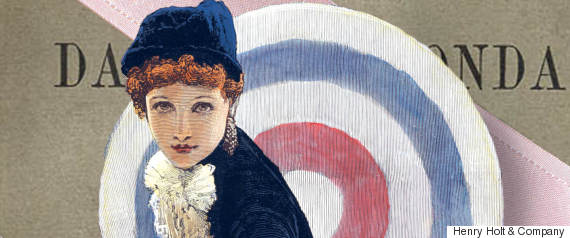
I read George Eliot's classic novel Daniel Deronda one rainy week in a rented cottage in a village similar to Pennicote, the small, boring and snobbish village to which Deronda's central female character, Gwendolen Harleth, is exiled (recalled from gambling and parties in the great cities of Europe) after her family loses its fortune. By that novel's end Gwendolen has endured not only the loss of status, hope and money but rejection by Daniel Deronda and marriage to a mega-rich, aristocratic sadist. She is also guilt-ridden, for when her worse-than-evil husband, falls off his boat into the Mediterranean, she resists saving him. "The rope, the rope," he calls, and she doesn't't throw it. She is exultant that he drowns, but returns to Mother and to the prospect of ostracism from Pennicote society.
I drove back to London from that rental cottage, thinking about how unfinished Eliot had left Gwendolen's life, wondering what on earth Gwendolen might have done next. She was fine archer and rider, trapped in nineteenth-century gowns, plumed hats and jewels, and a young woman temperamentally unsuited to be a governess or a teacher facing the dismal few opportunities for women of her time and social class. I thought she might need the outstretch of a twenty-first-century feminist hand. Gwendolen, the novel, which allows Gwendolen to grow up, to develop conscience, curiosity and depth, is my offering to her.
Readers now understand well from Gregory Maguire's novel Wicked, that Elphaba, formerly known as the Wicked Witch of the West, was neither wicked nor a witch, but a smart young crusader for justice. Although I wasn't thinking of Maguire's book at the time, I had a perhaps similar impulse to right the reputation of a famous fictional character. Eliot's Gwendolen was as vain and willful as she was stunningly beautiful. To me none of her supposedly negative qualities were without some merit. Nor were they necessarily limiting. The 20th-century literary critic F.R. Leavis believed Gwendolen Harleth to be the true focus of George Eliot's novel. He was impatient with Deronda and found his lengthy quest for a Jewish identity and homeland dull and distracting. In Gwendolen I excise most of Deronda's story, though I try to help Gwendolen understand why he rejected her. Without such understanding, the basis of any therapeutic process, I don't see how she can move on with her life.
My creative liberties as well as her freedom began when I let leave Pennicote for London and in a symbolic act of assertion and freedom fly high in a hot air balloon, sloughing off the misery of her past. I let her make friends with people not stifled by social and sexual prejudice: an American transvestite trapeze artist whose circus act holds his audience in thrall, a gay painter who takes her as his muse and in whom she can confide.
Such possibilities, though rare, existed in late 19th-century England. George Eliot's best friend was the feminist Barbara Bodichon, a cultured, adventurous woman, a suffragist and campaigner for women's rights and the founder of Girton College for women in Cambridge. In my novel the historical person Barbara Bodichon becomes Gwendolen's friend too. Bodichon, a modern woman, ahead of her time, is the link between then and now. She encourages Gwendoen to take risks, travel and dare to be herself.
George Eliot, with her partner George Lewes -- whom she couldn't marry because he couldn't get a divorce from his wife -- used hold afternoon salons at her London house. I arrange for Gwendolen to attend these too, to meet the person of George Eliot. Gwendolen is mystified that Eliot knows so much about her -- even what is in her mind. She views her as a clairvoyant who must know her future too. In these meetings between the author and her fictional creation, and my intrusion on their scene, I play with how blurred our sense becomes of who is real and who is imagined in our fictional, actual and virtual reality worlds. Why not?
Of course there are plenty of scholars and readers who think we should leave the classics be. That it's unforgivable chutzpah to interfere the way I do. I'm unapologetic. George Eliot's genius is undiminished. My only sorrow is that I couldn't do more for Gwendolen's romantic life and indulge her dream of perfect happiness with Deronda. But that just wasn't going to happen.
Diana Souhami is the author of Gwendolen.